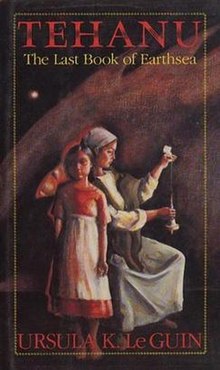Tehanu

Cover of first edition (hardcover)
|
|
| Author | Ursula K. Le Guin |
|---|---|
| Country | United States |
| Language | English |
| Series | Earthsea |
| Genre | Fantasy novel |
| Published | 1990 (Atheneum Books) |
| Media type | Print (hardcover and paperback) |
| Pages | 226 |
| Award | Locus Award for Best Fantasy Novel (1991) |
| ISBN | |
| OCLC | 19975630 |
| [Fic] 20 | |
| LC Class | PZ7.L5215 Te 1990 |
| Preceded by | The Farthest Shore |
| Followed by | Tales from Earthsea |
Tehanu: The Last Book of Earthsea is a fantasy novel by the American author Ursula K. Le Guin, published by Atheneum in 1990. It was the fourth novel set in the fictional archipelago Earthsea; a sequel following almost twenty years after the Earthsea trilogy (1968–1972); and not the last, despite its subtitle. It won the annual Nebula Award for Best Novel and the Locus Award for Best Fantasy Novel.
Tehanu continues the stories of Tenar, the heroine of the second book of the Earthsea series The Tombs of Atuan, and Ged, the hero of the first book, A Wizard of Earthsea.
Tehanu begins slightly before the conclusion of the previous book in the series, The Farthest Shore, and provides some information about the life of Tenar after the end of The Tombs of Atuan. She had rejected the option of life in Havnor, and instead arrived on Gont. For some time she lived with Ged's old master Ogion – but though fond of him, rejected Ogion’s offer to teach her magic. Instead, she married a farmer called Flint with whom she had two children, called Apple and Spark, and became known to the locals as Goha. It is mentioned that Ged was a bit disappointed in – and did not understand – Tenar's choice of a life.
At the book's outset her husband is now dead and her children grown up. Tenar lives on her own at Flint's property – Oak Farm – and is lonely and uncertain of her identity. She is brought a severely injured child, born of wandering vagabonds; the child’s natural father had pushed her into a campfire and left her for dead. Tenar helps to save the child's life, but the child is left with one side of her face permanently scarred and the fingers of one hand fused into a claw. Tenar adopts her and gives the child the use name Therru, which means "flame" in Tenar's native Kargish language.
...
Wikipedia
